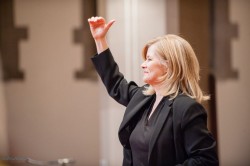 Stephanie Martin lives in Toronto near Eglinton and Dufferin where “pasta meets rasta.” Some of her other pastimes include yoga, French lessons, gardening, travelling and eating excellent food.
Stephanie Martin lives in Toronto near Eglinton and Dufferin where “pasta meets rasta.” Some of her other pastimes include yoga, French lessons, gardening, travelling and eating excellent food.
Canadian musician Stephanie Martin is a composer, conductor, organist, scholar, and consummate collaborator. While her musical values and appetites and curatorial instincts are deeply rooted in early music her work embraces much that is new. A busy associate professor of music at York University, Martin is the artistic director of Pax Christi Chorale, and the director of Scola Magdalena, an ensemble specializing in the chant and medieval polyphony for women’s voices. She is also a past director of music at the historic church of Saint Mary Magdalene. Somehow in between it all she finds time to consort with chamber groups such as I Fusiosi Baroque Ensemble, and maintains a vigorous blog on her website.
Just the basics? I was born in Tillsonburg Ontario. My earliest years were spent on my great-great-grandfather’s farm in Waterloo, Ontario. My family moved to Sackville New Brunswick where my Dad taught music at Mount Alison University. Then we came back to a dairy farm in Atwood, Ontario. I went to LDSS- Listowel District Secondary School where I sang in the excellent choir that Gerald Fagan created there, was a member of the drama club, and captain of the inter-varsity girls’ volleyball team! After high school I studied music at Wilfrid Laurier University in Waterloo where there was a cutting edge Early Music performance programme, as well as a specialized church music programme. I studied harpsichord with Michael Purvis Smith, organ with Barrie Cabena, recorder with Sue Prior, and lots and lots of history and theory and musicianship, with many opportunities to perform at school and in the community.
Suppose you're chatting with a fellow traveller, who asks what you do for a living? Yes - some people find it difficult to maintain a meaningful conversation once the word “harpsichord” is mentioned. And not everyone warms to “University Professor.” If I feel they can’t handle “medieval polyphony” I usually just move on and say “I’m a musician.”
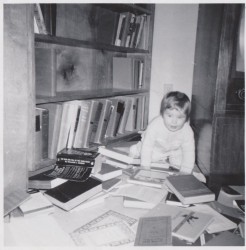 When you look at your childhood photo today, what do you think about? I do not remember posing for the photo, but I remember my childhood home always being filled with books – storybooks and history books and poetry and National Geographic magazines kept four kids pretty much out of trouble.
When you look at your childhood photo today, what do you think about? I do not remember posing for the photo, but I remember my childhood home always being filled with books – storybooks and history books and poetry and National Geographic magazines kept four kids pretty much out of trouble.
Imagine you could travel back through time and visit the young person in that childhood photo? Is there anything you would like to ask or tell her? I’m not sure what I would tell a two-year old who had just pulled down an entire shelf of books. I probably would not have the patience to snap a photo! I would tell my child self to observe everything, and to keep a diary, since the world has changed so much since I was 2 yrs old. I wish I had recorded my own observations of that way of life, and the people that brought me up, including my grandparents who lived in the Doddy Haus.
If you’d like to learn more about what a “Doddy Haus” is, click here
Other musicians in your family? Everyone in my large extended family has music in them. I come from the Mennonite heritage of singing a cappella in four parts at the drop of a hat.
Earliest memories of hearing music? I have a vivid and beautiful memory of sitting around a shining Christmas tree with my family singing “Silent Night” in our old farmhouse. That could be the first time I realized what music was. My Dad had an extensive vinyl record collection. I remember particular recordings like Britten’s Young Person’s Guide to the Orchestra, and a wonderful kid’s record called Tubby the Tuba. I recall being taken to live performances by my Dad, and often waking up after it was all over.
In Martin’s blog “Abner Turns Eighty” she says this, and more about her dad
“ … He never regretted giving up academia for a country life. Outside the farming, Abner gathered a group of rag-tag rural choristers to perform a precedent-setting Messiah, and in so doing, passed on a passion for singing big fat oratorios. He now supports what I do with Pax Christi Chorale, and he’s a great proofreader, with a keen eye for errors and omissions. ..”
First memories of making music? As a wee child I started copying what I heard the adults doing. I’d pick out a tune on the piano and then make up my own songs – mostly about animals. My first composition was “Poor little horse in the stable.” All my early works concerned animals.
And making music with others? Singing in the junior choir at Sackville United Church, conducted by my Mom. I remember that we were lifted beyond ourselves – a whole crowd of kids singing in a church basement sounding very strong and very sweet, and my own tiny voice fitting in as part of something big and wonderful.
Martin’s blog “In Memoriam Pete Seeger” offers us this additional window into the music she grew up with:
“ … The thing is, with Pete you were not a “fan.” You did not sit idly by and merely listen and pledge fan-ship to a performer. You did not “like” him on Facebook. You didn’t even buy the records. You didn’t have to because your parents already had them on the shelf. There wasn’t kid’s music and parent’s music, there was just music.
“‘No, you were not a fan. You were a collaborator. You were part of the band. You sang along with Pete. You kept singing long after the needle on the end of the arm of the record player had hissed and crackled to a halt. You harmonized with the big kids in the back seat of an un-air-conditioned Chevrolet touring around Nova Scotia. You filled the lazy 1970s summers with his songs, not listened to, but sung. You sang all the verses by memory, and then sang them again with a descant, then invented your own verses because you really didn’t understand the words. You tried to pick out the chords on your hopelessly out of tune, missing-stringed ukulele. You sang the songs at the top of your lungs (to confused cows, as if they were listening) thinking the power of your song could change the world. … “
First instrument, first teacher? The piano. My first piano teacher was Nancy Proctor who encouraged me to be creative and write new pieces for my lessons every week, alongside learning inventions by J.S. Bach. My second teacher Mrs.Noble in Sackville NB had a larger studio of students who performed “candy concerts” for each other. She organized us into duets and trios and entered us in festivals. She made performing seem like fun, and always rewarded us for good work. Those early experiences were very positive and so important!
We didn’t ASK Stephanie Martin this next question, she volunteered it.
What was my most embarrassing experience as a child learning music? I was entered in a sight-reading class for Kiwanis Festival. I guess my teacher thought I could do this since I generally played the pieces I was assigned every week. She had no idea that I was painstakingly translating the notes off the staff by their alphabetical names “All Cows Eat Grass,” and “Good boys eat fudge always” etc. and then memorizing the piece for my lesson. I had absolutely no idea how to sight read music. The sight-reading test began, and I played what I presumed was on the page. It sounded like a very odd piece indeed, but I figured it was supposed to be difficult. I left the stage and could tell by my mother’s expression that I had really screwed up. After that experienced I resolved to read music properly.
When did you first conduct other musicians? When did you first conduct for an audience? In high school a bunch of us used to get together to sing Palestrina for fun. At Listowel Mennonite Church we learned to lead hymn singing so we were coached on and how to give the right pitches, how to start (very important) how to stop (also important) basic conducting patterns, how to leave appropriate time between verses, how to choose the right tempo for the text. In high school I had my first job as a church organist for a two point Anglican parish in Listowel and Palmerston. I would ride in the Priest’s car and play for two services on Sunday mornings. I had to accompany Anglican chant and had absolutely no idea what I was doing, but the people were encouraging and kind.
Do you remember when you began to think of yourself as a career musician? Yes. I remember the exact moment. I was 12 years old and was allowed to sing in the Mennonite Mass Choir conducted by my Dad, for a performance of Handel’s Messiah. Strangely it was not while singing, but while listening to the orchestra play the Pastoral Symphony that I had my epiphany. It was the double basses pulling out long low notes that drew me into a magical world. I said to myself “I have to find a way to do this for the rest of my life.”
Did you ever think you would do something else? I desperately wanted to be an archeologist. Heinrich Schliemann was my hero. I also wanted to be a Shakespearean actor, an equestrian, a professional athlete, a sculptor, or an architect. I think that’s fairly normal isn’t it?
Where does music fit into your day-to-day life today? I do music every day, either teaching at York University, conducting Pax Christi Chorale, singing with Schola Magdalena, or when I have a spare moment, composing. I am writing a big choral symphony for performance in 2016, and finishing commissions for the Winnipeg Organ Festival, and for St. John’s Cathedral, Albuquerque.
UPCOMING…
Schola Magdalena sings Compline for Saint Cecilia on Nov 21. scolamagdalena.ca/concerts
Pax Christi Chorale will perform my cantata “Winter Nights” alongside two cantatas by Bach on December 6 & 7 paxchristichorale.org/winter-nights/
Any new recordings you are involved in? Recording a CD of my own compositions over the next year. A recent Youtube project of my music is here youtube.com/watch?v=Hu93FQxA-x4
CONGRAULATIONS TO OUR WINNERS! HERE’S WHAT THEY WON
“Winter Nights”, (Dec 6 & 7): The Pax Christi Chorale, led by Stepanie Martin, is joined by Michele Bogdanowicz, Sean Clark and Doug MacNaughton, for J.S.Bach’s Christmas Oratorio Part II; his Nun komm der Heiden Heiland; and Stephanie Martin’s own Winter Nights – a four- movement cantata for chorus, tenor soloist, strings, piano four hands, organ and percussion. Victoria Geottler and Ron Greaves each win a pair of tickets.
Alleluia: Sacred choral works by Stephanie Martin, was recorded at The Church of St Mary Magdalene by their award winning choir. These 18 tracks of (mostly) unaccompanied choral beauty are new settings of Anglican liturgical texts derived from the Psalms, the Mass and the evening service of Benediction. Copies of this CD go to Tatiana Voitovitch and Anne-Maria Pennanen.
Schola Magdalena is a six-voice women’s group dedicated to exploring chant and other medieval music, and new music for women’s voices. Scola Magdalena, led by Stephanie Martin sings Compline for St. Cecilia: plainchant and motets for women’s voices at The Church of St. Mary Magdalene on Nov 21. Virgo Splendens – Medieval music for Women’s Voices is their recent recording, and Richard Diver and Julie Rahn have each won a copy.
Music’s Children gratefully acknowledges Abner and Shirley, Jennifer, Larry, and Tim.


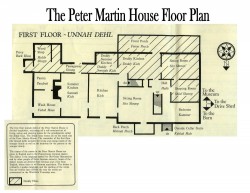
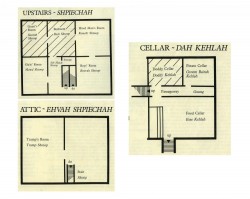


 Confluence Concerts: The Mandala
Confluence Concerts: The Mandala Sing! In Concert – O Canada! We Are The World
Sing! In Concert – O Canada! We Are The World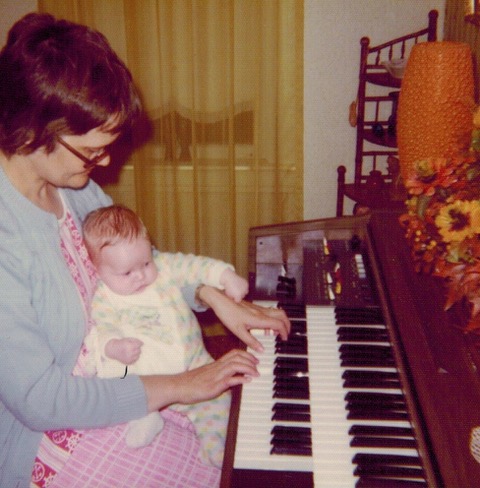 Prince Albert, Saskatchewan, 1976
Prince Albert, Saskatchewan, 1976